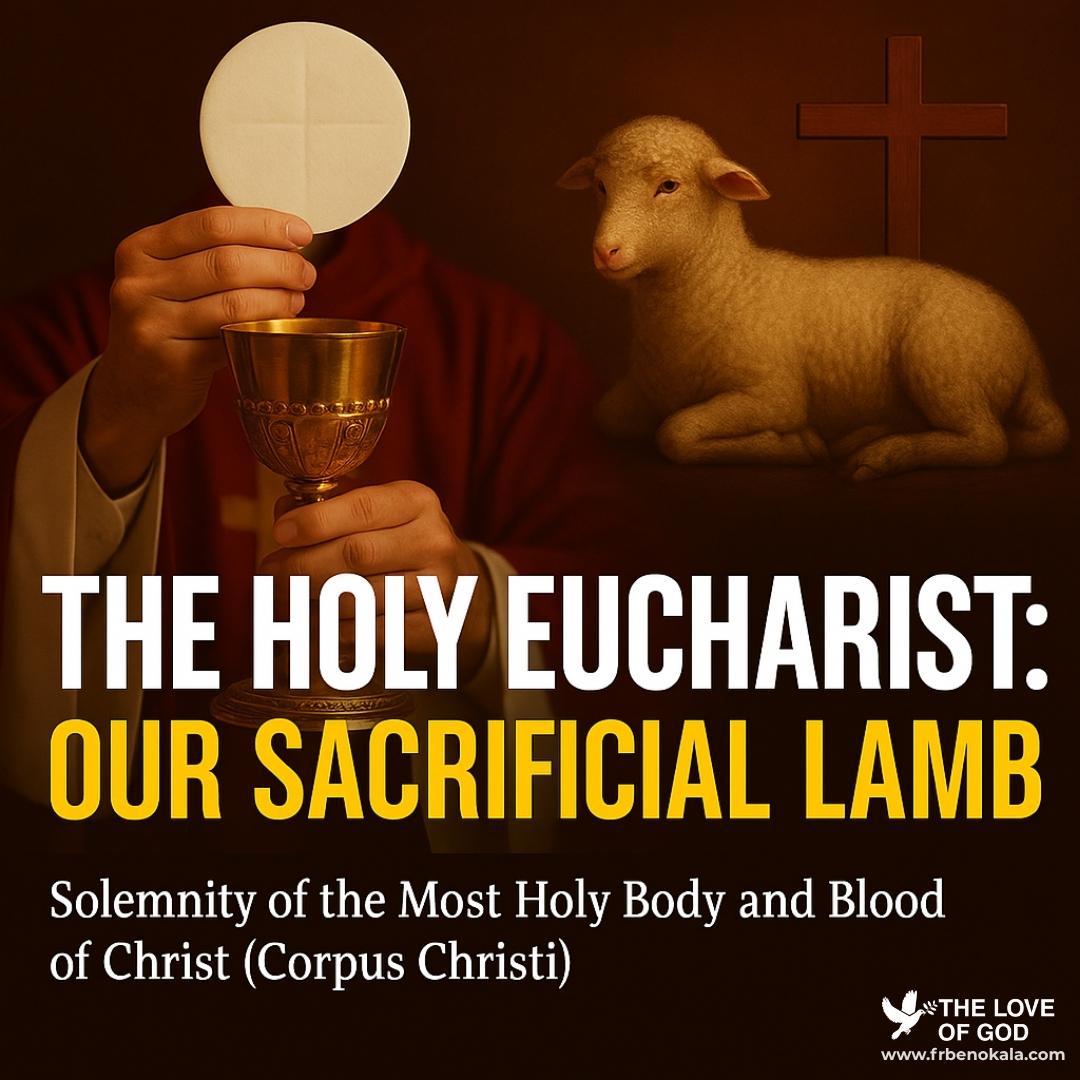Homily of 5th Sunday in Ordinary Time, Year A
First: Isaiah 58: 7-10; Second: 1 Corinthians 2:1-5; Gospel: Matthew 5:13-16
Introduction
Light and salt are two essential elements that make a positive difference in the world. They enhance productivity and tend to add value to people’s lives. Of course, the light brightens up the environment, while salt brings out the flavor in the food. Similarly, every Christian is given the mandate to make a positive difference in the world, like light and salt. That is, to uphold a high moral standard that will impact the lives of people positively as well as add value to their lives.
Regrettably, the reverse seems to be true in our contemporary society. Many people have become insipid and resorted to lowering their standards of honesty, diligence in work, conscientiousness, charity, and morality, all of which tend to be lowered. So how can we make a positive difference in the world? Continue Reading...
In the Gospel of today, Jesus Christ anchors His teachings, basically, on two parables, namely, “light” and “salt.” As usual, He often uses everyday metaphorical expressions to bring His teachings home to His hearers. He said that “we are the light of the world and the salt of the earth.” “Our light must shine in the world so that people may see our good works and give glory to our Father in Heaven” (Matthew 5:13–14). Meanwhile, to understand these two important parables used by Jesus Christ from the right perspective, we need to understand the characteristic features of the two elements, light, and salt. Light is a visible electromagnetic energy that produces a sensation of brightness in the eyes. In the absence of light, darkness prevails, and it would be practically impossible to see any color. But as soon as the light comes, it dispels the darkness, bringing joy, happiness, and peace of mind. People can now clearly see the need to do their work diligently. Salt is a crystalline compound obtained from the sea. It is a substance produced by the reaction of an acid (hydrochloric acid) with a base (sodium hydroxide), known as a neutralization reaction. Moreover, in the ancient world, salt was the most common of all preservatives and was highly valued. It is very essential for food preservation, seasoning, and savoring meat and other foods. Without salt, food can be quite tasteless and insipid. Therefore, if salt preserves things from corruption, and Christ said that we are the salt of the earth, then Christians must have a certain antiseptic influence in society. They should be the preservers and promoters of the true religion, which is anchored on love. In fact, Christians are commissioned to always add value to other people’s lives by bringing joy and happiness to them. Whenever we come closer to people, they should see Christ through our actions and thus have some kind of relief. Unfortunately, our society is in a quagmire today due to corruption. Also, nepotism, hatred, injustice, tribalism, greed, wickedness, jealousy, and betrayal, just to name a few. Many people have lost their sense of morality. They no longer add flavor or value to the lives of those around them. For instance, some people with negative mindsets always perceive negativity in everything. Even when you offer them financial help, they will still see it as evil money. They find it very difficult to appreciate their talents, not to mention of promoting the good works of others. Rather, they are happy to see others fall or not measure up. Perhaps if you are a type that is intelligent, handsome, beautiful, eloquent, rich, or gifted in many ways, all their efforts would be to tarnish your image or sabotage your efforts. Some may hate you, not because of anything wrong you did, but just because your strength or talent reminds them of their weaknesses. Whenever they hear any news about someone, they do not verify the facts but rather draw their own conclusions. All in a bid to discredit his or her personality. In the first reading, the prophet Isaiah urges us to “take away from us the yoke, the pointing of the finger, and speaking wickedness” (Isaiah 58:9). Furthermore, he points out ways that we can be light and salt today. These ways are ethical demands of the Kingdom of God, the very essence of discipleship. They are also comprehensive statements about the necessity of living in a way that reflects the Good News of Christ. They include practicing the corporal works of mercy and charity towards those in need. Feeding the hungry, providing shelter for people experiencing homelessness, clothing the naked, being there for your family, and avoiding selfishness, arrogance, and greed. Undoubtedly, so many people are in dire need of our help, and oftentimes, God allows them to come our way so that we can use our gifts to help them (Matthew 25:31–45). By so doing, we can prove our love for God. As the scripture says, “If anyone says, “I love God,” and hates his brother, he is a liar. For he who does not love his brother whom he has seen, cannot love God whom he has not seen” (1 John 4:20). He who loves his neighbor sincerely is thereby proving his true love for God. In the second reading, St. Paul reminds the people of Corinth that he did not come to preach to them with eloquent words of wisdom and intelligence. But to demonstrate the power of God so that their faith would not rest in the wisdom of men but rather in the power of God (1 Corinthians 2:4). So, what is the power of God in Christ that St. Paul preached? “THE CROSS!” (1 Corinthians 1:18–25). What happened on the cross? The demonstration of God’s love by Jesus Christ and His command for us to do so if we truly love Him (John 15:14, 17). So, what is all this love about? Jesus Christ, the light of the world (John 8:12), made it known to His disciples when He said, “This is my commandment: that you love one another as I have loved you.” “Greater love has no man than this, that a man lay down his life for his friends” (John 15:12–13). “People will know that you are my disciples if you have a love for one another” (John 13:35). True charity or love helps to bring one out of darkness (Isaiah 58:10) since love covers a multitude of sins (1 Peter 4:8). Hence, true love is the surest way to become light and salt to others. As Christians who are the light of the world and the salt of the earth. We should be constantly engaged in making the part of the world that we live in better than we found it. One thing that light and salt have in common is that both make a difference wherever they are. When they fail to serve their purpose, they won’t be useful again. So, we should continually strive to make a positive difference in the world through our very lives. Our lives ought to bring joy, happiness, and peace of mind to others. How? By sharing our talents, resources, and knowledge with people around us. We should strive to create a better, more conducive atmosphere in our workplace, community, Church, and especially our country. Moreover, we should constantly participate in building a better nation, not merely one that is materially prosperous and economically sound. But one that is founded on sound moral principles such as justice, equity, fairness, and freedom. Also, respect for human life and dignity, accountability, probity, fear of the Lord, and above all, love. Therefore, with these qualities, our light would break forth and our healing would spring up quickly. May the Holy Spirit give you the grace to always uphold sound moral principles that will impact positively and add value to the lives of people like light and salt, through Jesus Christ, Our Lord, Amen. Peace of Christ be with you… Rev. Fr. Ben Okala, C.S.Sp.We are the Light of the World and Salt of the Earth
Features of Light
Features of Salt
Negative Attitudes of Those Who Have Lost Their Saltiness and Turned Dark toward Others
Ways to Become Light and Salt in the World
We are called to be Salt and Light for Others
The Surest Way to Become Light and Salt for Others is through love.
Jesus Christ is the True Light of the World
Conclusion



